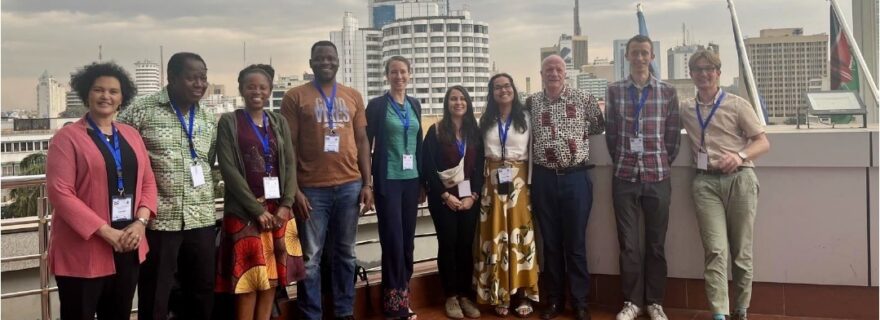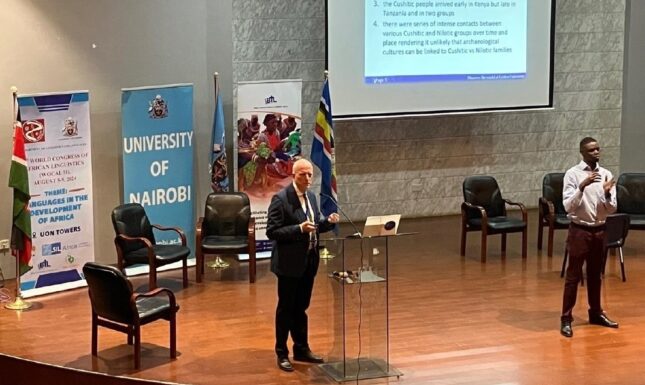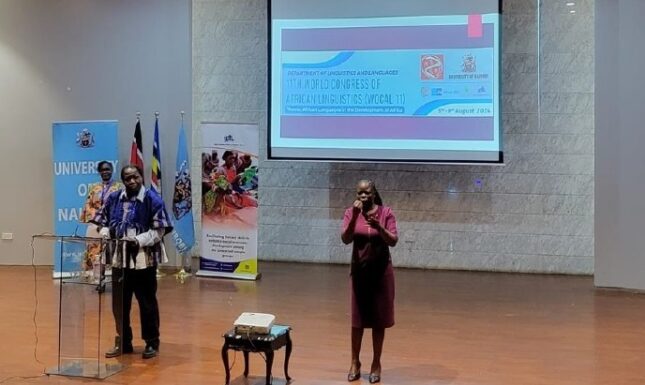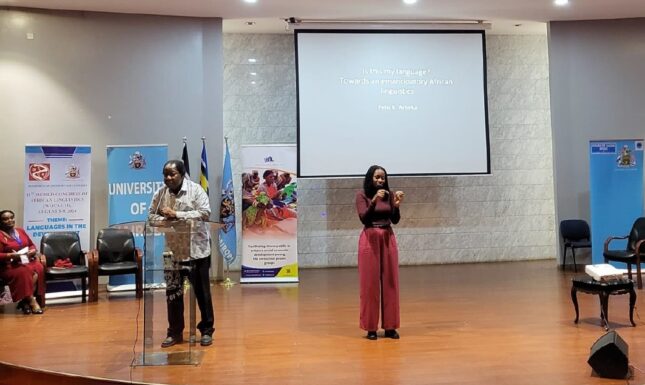Do you know what we did last summer?
Ever wonder what researchers get up to over summer? They often continue with their research and conduct crucial knowledge exchange with fellow researchers all over the world. Read all about how a group of linguists from Leiden attended the World Congress of African Linguistics (WOCAL) in Kenya.
It takes place once every three years, and, ever since 1994, has been a long-standing highlight in the field of African Linguistics. We’re talking about the World Congress of African Linguistics (WOCAL 11), which took place in Nairobi Kenya from the 5th - 9th of August. For those of you not familiar with WOCAL; it is a conference like no other (but we might be somewhat biased given our field of research). Hosted alternately in Africa and in the rest of the world, WOCAL is described as being the only truly international and pan-theoretical conference in the field of African Linguistics.
Leiden scholars in Nairobi
Having had to host the previous edition online due to the pandemic (WOCAL10 in 2021), our group at the Centre for Linguistics were excited to attend WOCAL 11 in person. Although, as is becoming increasingly customary for many international conferences, WOCAL 11 was also organised in a hybrid format. In this way as many people as possible could participate in this unique scientific get-together.
It was an honour for us that our team had been invited to give three of the plenary speeches. Professors Felix Ameka (president of WOCAL), Nancy Kula, and Maarten Mous gave inspiring talks on their areas of expertise (for the complete list of contributions and topics, read until the end of the post). Not only that, our Leiden team (including former and current students) also contributed eighteen papers and co-organised two panel discussions:
- ‘Language and history of culinary culture: linguistic studies on food production and preparation’ (convenors Azeb Amha, Felix Ameka, Maud Devos, Nancy Kula)
- ‘Animal coats and appearance’ (Sara Petrollino).
And to top things off, Azeb Amha (from the Africa Study Center) was appointed as Steering Committee member for WOCAL; as representative for the Central European division.
6th African sign language workshop
Our participation didn’t stop there. Marta Morgado (former PhD student at LUCL), Victoria Nyst (LUCL) and Hope Morgan (former researcher at LUCL) organised the 6th African sign language workshop at WOCAL, which, for the first time ever, constituted a full five-day programme.
The WOCAL African sign language workshop brought together sign linguists and deaf activists from Kenya and neighbouring countries, creating a unique platform for exchanging knowledge about research results and wishes for future research. Judging by its attendance and participation, this 6th edition definitely succeeded in solidifying an international network of researchers and community members working on African sign languages.
Conference theme: African languages in the development of Africa
Since language is a crucial resource in the development of sustainable societies, WOCAL11 focused on exploring the gains, milestones and challenges in the use of African languages for development in Africa. The theme was explored from a wide range of angles and from many different perspectives. This is such an important reminder for us. Conferences such as this one give us the perfect opportunity to reflect on the differences and inequalities that still exist within our field.
Conferences like this are crucial for networking and exchange of knowledge, which leads us that bit closer to gaining a greater understanding of linguistic diversity. WOCAL once again highlighted the breadth of our field of research. We met our new research partners, started fresh research collaborations and tested our ideas by means of the unique WOCAL-attending audience. Young researchers, such as PhD students, are able to connect with senior researchers and meet their peers from other universities.
Heartfelt thank you
From all of us here at Leiden, congratulations to our Kenyan colleagues for organising such a large and successful hybrid event and thank you for ensuring our safety during the demonstrations in Nairobi. We cannot wait for the next WOCAL!
Contributions by affiliated researchers at Leiden University (in alphabetical order):
Felix Ameka: “Is this my language?” Towards an Emancipatory African Linguistics (keynote); The cultural semantics of terms for tools and manners of food preparation in Kwa languages (presentation)
Azeb Amha: “We kill, to bring more life”: discourse on the life cycle of ensete plant in Zargula
Tano Angoua (former PhD): Deaf People and Inclusive Education in Côte d’Ivoire: Challenges and Opportunities; Triglossia: a common trait of sign language ecologies in West Africa? (together with Victoria Nyst, Tatiana Koumba Richie, Timothy Hadjah, Moustapha Magassouba, Dieydi Sylla)
Isaac Eaton (former student): The consonant inventory of Proto-Tsonga-Copi
Hilde Gunnink: Teasing apart Shona’s linguistic strata: New insights from comparative Bantu pottery vocabulary (together with Nina van der Vlugt, Koen Boston)
Timothy Hadjah (former PhD): Signed languages used in Ghana: Mensuration of lexical similarities and the eclipse of local signs; Triglossia: a common trait of sign language ecologies in West Africa? (together with Nyst, Tatiana Koumba Richie, Tano Angoua, Moustapha Magassouba, Dieydi Sylla); Classroom to Community: The Influence of Deaf Education on Cardinal Number Variations in Ghanaian Sign Language (together with Miracle Oppong Peprah)
Elisabeth Kerr: (former PhD): Split subjects in Mbam Bantu
Nancy Kula: Tonal change in Bantu: A case study of generational tone change (keynote); The use and function of food terminology for culinary and health purposes among the Bemba of northern Zambia (presentation); On the semantics of postfinal markers -tu and -diwith the APPL in Cinyungwe (Bantu N43) (together with Crisofia Langa da Camara and Hanna Gibson)
Sjef van Lier (former student): The lnguistic history of some for ‘Donkey’-related roots in Cushitic
Mariana Martins: Word formation in the emerging sign language of Guinea-Bissau
Marta Morgado (former PhD): Social interaction in Guinea-Bissau Sign Language (LGG)
Maarten Mous: The linguistic landscape in East Africa 2-3000 BP: African languages and African history (keynote)
Victoria Nyst: Triglossia: a common trait of sign language ecologies in West Africa? (together with Tatiana Koumba Richie, Tano Angoua, Timothy Hadjah, Moustapha Magassouba, Dieydi Sylla)
Sara Petrollino: Hamar "appearance": meaning, distribution and variation
Jeroen van Ravenhorst (current student): The linguistics of humananimal interaction in Hamar
Tatiana Koumba Richie: History of sign languages in Gabon: the impact of deaf education and deaf associations; Triglossia: a common trait of sign language ecologies in West Africa? (together with Nyst, Tano Angoua, Timothy Hadjah, Moustapha Magassouba, Dieydi Sylla)
Djibrila Tetereou: The meaning of cattle terms in Fulfulde Juguureere: a preliminary investigation
Nina van der Vlugt (former student): Teasing apart Shona’s linguistic strata: New insights from comparative Bantu pottery vocabulary (together with Hilde Gunnink and Koen Boston)
Jenneke van der Wal: Preverbal focus in Kîîtharaka revisited (together with Patrick N. Kanampiu)
*Header photo from left to right: Azeb Amha, Felix Ameka, Nancy Kula, Djibrila Tetereou, Jenneke van der Wal, Sara Petrollino, Nina van der Vlugt, Maarten Mous, Jeroen van Ravenhorst, Sjef van Lier
**Carousel photos:
- Prof. dr. Nancy Kula delivering the keynote speech
- Prof. dr. Maarten Mous delivering the keynote speech
- Prof. dr. Felix Ameka opening the WOCAL11 conference
- Prof. dr. Felix Ameka delivering the keynote speech






